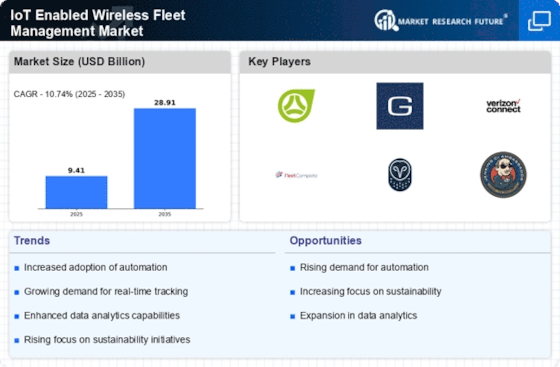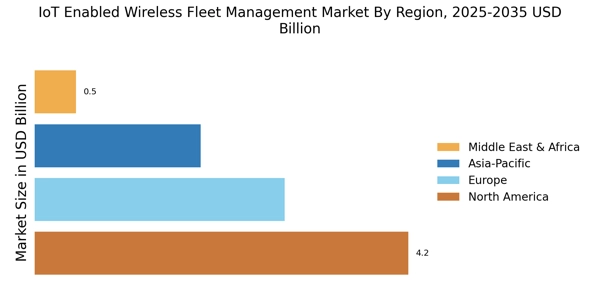Enhanced Operational Efficiency
The IoT Enabled Wireless Fleet Management Market is witnessing a surge in demand for solutions that enhance operational efficiency. Companies are increasingly adopting IoT technologies to streamline their fleet operations, reduce downtime, and optimize routes. This trend is supported by data indicating that organizations utilizing IoT solutions can achieve up to a 20% reduction in operational costs. By leveraging real-time data analytics, fleet managers can make informed decisions that lead to improved resource allocation and increased productivity. The ability to monitor vehicle performance and driver behavior in real-time further contributes to operational efficiency, making it a critical driver in the IoT Enabled Wireless Fleet Management Market.
Growing Demand for Cost Reduction
Cost reduction remains a pivotal driver in the IoT Enabled Wireless Fleet Management Market. Businesses are under constant pressure to minimize expenses while maintaining service quality. IoT solutions facilitate this by providing insights into fuel consumption, maintenance needs, and driver performance. Reports suggest that companies implementing IoT-enabled fleet management can save approximately 15% on fuel costs alone. Additionally, predictive maintenance capabilities help prevent costly breakdowns, further enhancing cost efficiency. As organizations strive to improve their bottom line, the demand for IoT solutions that support cost reduction is likely to grow, reinforcing their importance in the IoT Enabled Wireless Fleet Management Market.
Rising Importance of Data Security
Data security has emerged as a crucial driver in the IoT Enabled Wireless Fleet Management Market. With the increasing reliance on connected devices, the risk of cyber threats has escalated. Fleet management systems that utilize IoT technology must prioritize data protection to safeguard sensitive information. Companies are investing in advanced security measures, such as encryption and secure access protocols, to protect their data from breaches. The potential financial and reputational damage from cyberattacks underscores the necessity for robust security solutions. As awareness of these risks grows, the demand for secure IoT-enabled fleet management solutions is likely to rise, shaping the future of the IoT Enabled Wireless Fleet Management Market.
Advancements in Connectivity Technologies
Advancements in connectivity technologies are propelling the IoT Enabled Wireless Fleet Management Market forward. The proliferation of 5G networks and improved satellite communication systems enhances the ability of fleet management solutions to transmit data in real-time. This increased connectivity allows for more accurate tracking of vehicles and assets, leading to better decision-making. Furthermore, the integration of edge computing with IoT devices enables faster data processing and reduces latency. As connectivity technologies continue to evolve, they are expected to unlock new capabilities within the IoT Enabled Wireless Fleet Management Market, driving further adoption and innovation.
Regulatory Compliance and Safety Standards
The IoT Enabled Wireless Fleet Management Market is significantly influenced by the need for regulatory compliance and adherence to safety standards. Governments worldwide are implementing stringent regulations regarding vehicle emissions, driver safety, and operational transparency. IoT technologies enable fleet operators to monitor compliance in real-time, ensuring that they meet legal requirements. For instance, telematics systems can track vehicle emissions and provide data necessary for compliance reporting. This focus on regulatory adherence not only mitigates legal risks but also enhances the reputation of companies within the IoT Enabled Wireless Fleet Management Market. As regulations evolve, the demand for compliant IoT solutions is expected to increase.

















